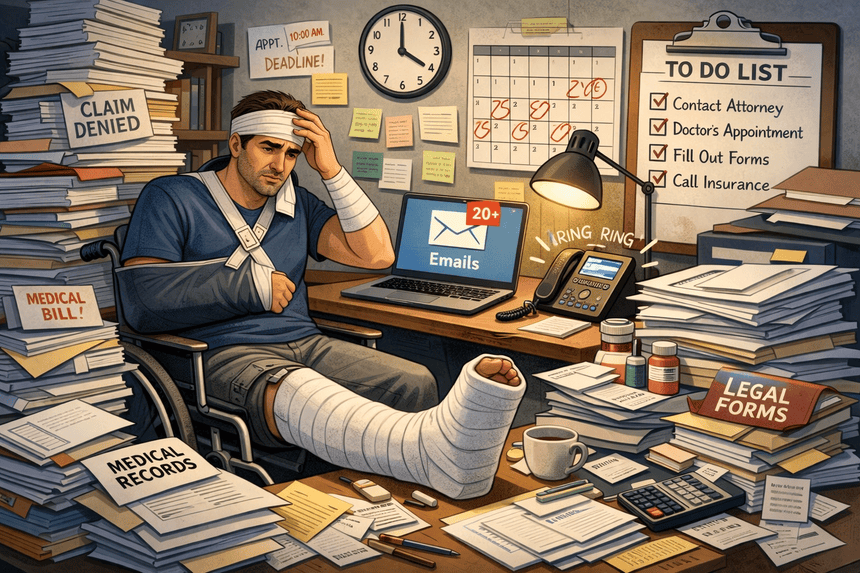Filing for bankruptcy is a big decision. But for many people, it’s not the legal process that feels overwhelming; it’s the paperwork that piles up. If you’re already stressed by debt, the last thing you want to do is spend hours trying to decode court forms, figure out what each document means, and worry whether you’ve filled out everything accurately or not.
But who says you’ve got to do it alone? Bankruptcy petition preparers can help with the starting and most crucial part of the whole filing process. If you’ve never heard of them, you’re not alone. However, they play a valuable role in helping people get through the filing process efficiently and affordably. This guide here offers an in-depth summary of these professionals’ roles, what they can do, what they can’t, and how they make the path to financial relief a lot less stressful.
Who Are Bankruptcy Petition Preparers?
Let’s start with the basics. Bankruptcy petition preparers are non-attorneys who help individuals prepare and organize bankruptcy paperwork. Their job is to take the information you provide and make sure it’s entered correctly into the required federal forms, accurately, professionally, and in compliance with the court’s formatting rules.
They are often the go-to choice for people who:
- Can’t afford a bankruptcy attorney
- Are you filing a straightforward Chapter 7 case
- Want help organizing the paperwork but plan to represent themselves
They’re not there to give legal advice. They’re not lawyers. And they’re not trying to be. But for many people, they offer a lifeline between being completely on your own and spending thousands on legal fees.
What Bankruptcy Petition Preparers Can (and Can’t) Do
If you’re considering this route, it’s important to understand where their role starts—and where it stops. But before giving you a quick breakdown, if you want your process to be seamless, you can trust professional service providers like, BankRuptcy Petition Prepare Chapter 7.
They CAN:
- Help you complete official bankruptcy forms
- Ensure all documentation is typed, formatted, and filed correctly
- Provide you with copies of all paperwork
- Guide you through what’s required without interpreting the law
They CANNOT:
- Tell you which bankruptcy chapter to file under
- Offer advice about property exemptions or legal strategy
- Represent you in court or speak with the trustee on your behalf
- Answer legal questions about your specific situation
Their role is to help you complete and file documents, not to advise you on the law. That distinction matters not just for clarity but for legal compliance. In fact, federal guidelines are very clear that bankruptcy petition preparers cannot cross the line into legal territory. Doing so could result in penalties for them—and confusion or complications for you.
Why Some People Choose This Route
You might be wondering, “Why not just hire an attorney?” It’s a fair question. But the truth is, not everyone can afford to. Legal aid is expensive! Even the most basic attorneys offer their services for the lowest of $1,500. For someone already drowning in debt, it could be money they don’t have.
For straightforward cases, especially “no-asset” Chapter 7 filings where you’re not at risk of losing property, many people find that working with a preparer is a practical, cost-effective solution.
They get help managing the paperwork. They avoid delays caused by incomplete or incorrect forms. And they save hundreds (sometimes thousands) of dollars in professional fees.
But they still stay in control of their own case.
What’s the Process Like?
Legal processes are always kind of scary, and bankruptcy isn’t any different. Even with secondary help, that tightness in your chest won’t go away until the court makes a decision. However, you can be relieved that even if you do work with a bankruptcy petition preparer, they can provide relief with the documentation and paperwork side of things.
Their process is fairly straightforward. Here’s how it typically goes:
- You provide the information: This includes your income, assets, debts, expenses, and recent financial activity.
- They organize and input it into the official court forms.
- You review everything and sign all required documents.
- They file the forms with the court (if local rules allow electronic filing).
- You receive copies of everything that’s submitted, along with filing instructions.
Make no mistake, throughout the process, you’re still in the driver’s seat. The preparer is there to help you stay organized and make sure nothing falls through the cracks.
Michigan’s Guidelines: What You Should Know
If you’re someone that’s battling debt and bankruptcy in Michigan it’s important to note that bankruptcy petition preparation is also governed by local rules.
For example:
- Preparers must sign all documents they help complete.
- They must disclose their identity and SSN on official forms.
- They cannot advertise themselves as offering “legal” services.
- Most courts limit the fee for document preparation (often under $200 unless approved otherwise).
These rules are designed to protect you—and reputable preparers follow them to the letter. If you ever feel unsure about someone you’re working with, don’t be afraid to ask questions or contact the U.S. Bankruptcy Court directly.
A Quick Word on “Simple Cases”
Let’s be clear: bankruptcy isn’t simple. It’s a serious process with real legal consequences. But the truth is, some cases are much more complex than others.
If your situation looks like this:
- You have no major assets (like second homes or investment properties)
- You’re dealing mostly with credit card debt or medical bills
- You have a steady job—or no income at all
- You’re not behind on mortgage or car payments
Then, you might be a strong candidate for a simple Chapter 7 Bankruptcy case—the kind where a bankruptcy petition preparer can be a helpful part of your filing journey.
When You Might Need More Than a Preparer
There are situations where a bankruptcy petition preparer won’t be enough, and that’s okay.
You may want to speak with an attorney if:
- You’re behind on your mortgage and want to keep your home
- You have joint debts with someone else (like a spouse or co-signer)
- You’re trying to discharge student loans or tax debt
- You’ve filed for bankruptcy before
- You’re being sued or facing aggressive creditor actions
Remember, preparers are there to help with the process, not provide guidance on legal choices. If you’re facing any of the issues above, even just a quick legal consultation could be a smart step before moving forward.
Conclusion
Filing for bankruptcy is never an easy choice. But if you’re already there, having the right help can make a huge difference. And bankruptcy petition preparers are part of that help for many people.
They’re not a substitute for legal advice, but they’re a valuable resource—especially for those who are trying to get back on track without getting buried by attorney fees.









